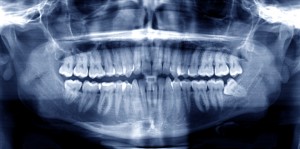 Say the word “teething” and most people think of a baby. However, adults can have similar painful and uncomfortable symptoms when wisdom teeth are trying to erupt. Also called third molars, wisdom teeth usually come in between the ages of 17 and 25. Impacted wisdom teeth—those that are trapped below the gum line—present the most trouble and problematic symptoms. Read on to learn more about the signs indicating that you may need wisdom teeth removal in Dallas and how the procedure is carefully addressed at Texas Wisdom Teeth.
Say the word “teething” and most people think of a baby. However, adults can have similar painful and uncomfortable symptoms when wisdom teeth are trying to erupt. Also called third molars, wisdom teeth usually come in between the ages of 17 and 25. Impacted wisdom teeth—those that are trapped below the gum line—present the most trouble and problematic symptoms. Read on to learn more about the signs indicating that you may need wisdom teeth removal in Dallas and how the procedure is carefully addressed at Texas Wisdom Teeth.
June 8, 2017
When Should You Have Wisdom Teeth Removal in Dallas?
October 8, 2015
Wisdom Teeth Removal with the Dallas Oral Surgeon
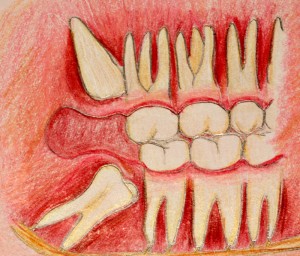
An oral and maxillofacial surgeon is specially trained to perform many kinds of surgical procedures in and around the mouth, face and jaw. These surgeries include wisdom teeth removal, dental implant surgery, jaw realignment surgery and soft tissue repair. Thus, oral surgeons effectively bridge a gap between dentistry and medicine, and therefore must complete an additional four to eight years of specialized training beyond the years of education they receive in dental school.
(more…)
February 22, 2015
Wisdom Tooth Problems
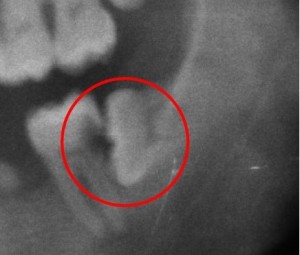
Decayed second molar caused by impacted wisdom tooth
Most adults have had wisdom tooth problems at some point in their life. How do you know if you need to have the teeth removed or not? The answer is not always dependent on whether or not you are experiencing tooth pain. While these teeth, clinically referred to as third molars, do not always need to be removed, there are quite a few reasons why your dentist might recommend wisdom teeth removal.
Wisdom Tooth Pain
Your third molars often cause pain when they erupt (come in to the dental arch). If the teeth are impacted, meaning they are trapped beneath gum tissue or bone, they can be chronically painful as the gums get inflamed or infected A tooth impacted only partially can become a food trap and harbor bacteria and plaque which cause tooth decay. Problems such as chronic infection, inflammation or cavities are indicators that wisdom teeth should be removed.
Cysts and Other Pathology
Sometimes, an impacted tooth forms a cyst around it. A cyst is a fluid filled sac that can grow to be quite large. As the cyst grows, it destroys healthy bone tissue in the jaw, which can cause a variety of dental problems. Most cysts that form around the third molars are benign, but can be destructive. Over time, the cyst can damage the molars adjacent to it, leading to tooth loss. If your dentist sees a cyst growing around a wisdom tooth, he will likely recommend that you have it along with the tooth removed in order to prevent damage to healthy teeth later on. A cyst around a tooth is often not painful or symptomatic, and is usually diagnosed using a panoramic x-ray.
Damage to Adjacent Teeth
When a tooth is impacted, it can be positioned in such a way that it tried to erupt directly into the roots of the tooth in front of it. When this happens, the roots of the adjacent teeth can become damaged to the point that they cannot be repaired. In a situation like this, the second molars are placed under a lot of pressure. The pressure causes the teeth to move out of alignment. Many people with impacted wisdom teeth find that their molars have shifted, causing them to frequently bite their cheeks when eating or talking.
Orthodontics and Wisdom Teeth
Many orthodontists recommend that their patients have their third molars extracted upon completion of their orthodontic treatment. This is advised in order to prevent shifting of the teeth caused by pressure from the wisdom teeth. After spending a year or two in braces, nobody wants their teeth to get crooked again! Extracting the third molars can often help prevent some orthodontic relapse.
Does Everyone Need Wisdom Teeth Removed?
Not everybody needs to have their third molars extracted. Some teeth come into the dental arch fully and in line with the other teeth. If they are not difficult to keep clean and healthy, and show no signs of pathology, your dentist may tell you to leave them alone. If your dentist recommends that you remove the teeth, it is a good idea to take care of the problem before major problems occur.
For more information about your wisdom teeth, or to schedule an appointment, visit Texas Wisdom Teeth and Dental Implants.
July 13, 2014
Wisdom Teeth Problems
The removal of wisdom teeth during the teen years and early 20’s is often recommended when symptoms and problems are present. Wisdom teeth pain is the most common symptom, but not the only reason dentists prescribe removal of the third molars. Here is what you need to know about wisdom teeth problems.
 Wisdom Teeth Pain
Wisdom Teeth Pain
The third molars, commonly known as wisdom teeth, come in during the teen years. Pain from eruption of the teeth is common. Sometimes the wisdom teeth do not come in all the way, a condition called ‘partial bony impaction’. In cases such as these, the tissue surrounding the exposed portion of the tooth can become chronically irritated and inflamed. If wisdom teeth cause pain, it is a good idea to have them evaluated by your dentist or oral surgeon to determine whether they need to be removed or not.
Infected Wisdom Teeth
Chronic infection of the soft tissue surrounding the exposed portion of an impacted wisdom tooth is called ‘pericoronitis’. When left untreated, the infection can lead to gum disease, eventually involving the second molars. It is not uncommon for gum disease to spread to the adjacent teeth, increasing the chances of losing the second molars in time. Gum disease is a bacterial infection that attacks the bone and gum tissue surrounding the teeth. As gum disease becomes more advanced, the bone is destroyed and gum tissue falls away. This advanced stage of gum disease can cause teeth to become loose and painful. Untreated gum disease almost always leads to tooth loss.
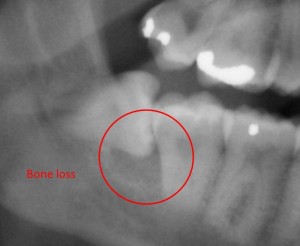
Bone loss behind second molar caused by impacted wisdom tooth
Damage to Adjacent Teeth
Impacted wisdom teeth which are malpositioned often put pressure on the adjacent second molars. Over time, this constant pressure can dissolve the roots of the second molars, leading to tooth decay and even tooth loss. When wisdom teeth are impacted horizontally (laying down sideways) the risk of damage to the second molars is high.
Cysts and Tumors Around Wisdom Teeth
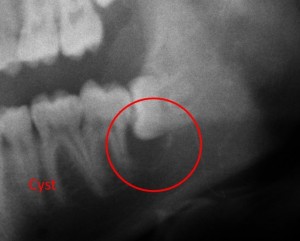
a cyst causes bone loss around both second and third molar
Sometimes, impacted wisdom teeth develop pathology such as cysts and tumors. If this happens, it is important to remove the wisdom teeth to avoid damage to the jaw and teeth. Cysts and tumors destroy healthy bone and can weaken the jaw bone, involve the adjacent teeth and cause pain. In cases of advanced pathology, large cysts and tumors create a high risk of jaw fracture from the weakening of the jaw bone. Additionally, cysts and tumors should be examined microscopically by a pathologist to ensure the growths are not malignant.
Removing Wisdom Teeth to Preserve Orthodontic Results
Braces are expensive, and once they come off nobody wants their teeth to get crooked again. Orthodontists strongly recommend wearing orthodontic retainers for as long as possible following orthodontic treatment. This is because they know that teeth can still shift back into crowding and misalignment without retention. When wisdom teeth interfere with orthodontic results by placing pressure on adjacent teeth, they can cause orthodontic relapse. Many orthodontists recommend the removal of impacted wisdom teeth in conjunction with orthodontic treatment in order to prevent the teeth from become crowded or crooked once the braces re removed.

Decayed second molar caused by impacted wisdom tooth
Cavities in Wisdom Teeth
The wisdom teeth are the last molars, far back in the jaw. Their position makes dental hygiene more difficult. For this reason, wisdom teeth often become decayed and develop painful cavities. If this happens, the solution is often removal of the wisdom teeth, rather than repair. Because they are difficult to keep clean, decay is often recurring. Removing the decayed wisdom teeth makes it easier to keep the back teeth and gums healthy and cavity- free.
Do I Need My Wisdom Teeth Removed?
The best way to find out if your wisdom teeth are causing problems is to schedule a consultation with an oral surgeon. Your oral surgeon will take an x-ray to evaluate the position, health and identify any pathology that may be associated with the wisdom teeth. If problems exist, a plan will be recommended to remove them. Wisdom teeth removal is considered minor surgery, and can be done in the oral surgeon’s office while you sleep comfortably. Your doctor will review your medical history, explain the procedure and anesthesia, and give you special instructions to prepare for the procedure. Expect to rest the rest of the day and plan 2-3 days to recover from the surgery. For more information about wisdom teeth removal, visit our website.
May 7, 2014
Getting Wisdom Teeth Removed During Summer Vacation
Got wisdom teeth?
 Most teenagers and young adults experience the arrival of the third molars, or wisdom teeth, between the ages of 14 and 25. While not all wisdom teeth must be removed, those which are causing problems or likely to cause problems are often recommended for extraction. Some of the most common reasons for extraction of wisdom teeth are:
Most teenagers and young adults experience the arrival of the third molars, or wisdom teeth, between the ages of 14 and 25. While not all wisdom teeth must be removed, those which are causing problems or likely to cause problems are often recommended for extraction. Some of the most common reasons for extraction of wisdom teeth are:
- Chronic infection of the gum tissue around the wisdom teeth
- Malpositioned or impacted wisdom teeth
- Cysts, tumors or other pathology forming around the wisdom teeth
- Dental crowding or prevention of orthodontic relapse following braces
- Wisdom tooth decay or gum disease
Your dentist or orthodontist may recommend evaluation of the wisdom teeth by an oral surgeon in order to determine if they must be removed. Because the “age of wisdom” falls during the school ages, it is common for dental patients to have the oral surgery evaluation and any needed treatment performed during the summer, when it is less likely to interfere with school or sports. It is important to consider treatment of symptomatic or pathologic wisdom teeth when it is recommended, and plan for the treatment on a timeline that works best with your schedule.
What To Expect With Wisdom Tooth Surgery
Wisdom teeth removal is considered minor surgery, and should be planned for taking into consideration all preparations and accommodations necessary in order to make the experience as smooth and comfortable as possible.
- Plan to see the oral surgeon for consultation in order to receive all needed information and answers to any questions you may have
- Schedule your procedure when you will be able to take 1-3 days to recover at home
- Do not plan air travel or water sports during the week following your procedure
- Expect to be on a softer diet for a few days following treatment
- If you participate in any sports, exercise regimens or play a woodwind instrument, discuss this activity with your surgeon at your consultation
- Most patients experience post-operative discomfort that is easily controlled with over the counter medications such as Advil or Aleve. You may require prescription pain medications during the first 1-2 days following your procedure.
- General Anesthesia is usually used during wisdom teeth removal. This makes the procedure easy and comfortable for the patient. Most patients wake up after surgery feeling very relaxed and comfortable.
- A complete medical history is required, and will be reviewed with you during consultation. If you have any medical conditions, take medications or drugs, it is extremely important that you discuss this with your surgeon beforehand
- Follow all pre and post-operative instructions in order to ensure the best experience possible.
The Cost of Wisdom Teeth Surgery
One big concern for patients who have had wisdom tooth removal recommended to them is the cost of surgery. While all patients want to do the best thing to help keep their mouth healthy, financial concerns do have an influence on the decision to proceed with needed treatment. Your Dallas oral surgeons at Texas Wisdom Teeth and Dental Implants know that the cost of oral surgery can be hard on a family. That is why every effort is made to utilize resources that can help with the cost of wisdom teeth removal.
- Maximizing dental insurance coverage- your business office representative understands dental insurance, and can help navigate the coverage requirements in order to help maximize the participation of your insurance plan
- Utilizing HSA and medical flex benefits- most oral surgery is eligible for reimbursement under these employer sponsored plans
- Interest Free Financing- healthcare credit companies such as Care Credit and Springstone Financial make it possible to budget for the cost of wisdom teeth extraction with low monthly payments and no interest charges if paid within 6 months.
- No Insurance? Special cash discounts for private-pay patients are available at Texas Wisdom Teeth and Dental Implants. Using this special, you can save almost half the usual cost of wisdom teeth surgery.
- FREE Consultation and panoramic x-ray- You can download a coupon for free consultation and x-ray here.
For more information on wisdom teeth symptoms and problems, click here. If you need to schedule a consultation, or want information about your dental insurance coverage, give us a call at 972-960-1111.
February 21, 2014
Wisdom Teeth Removal During Spring Break
Everybody loves Spring Break! A week long reprieve from classes, exams, and studying intended to allow us to indulge the Spring Fever that inevitably infects us as soon as the weather starts to improve and the days become a little longer. You might think of wisdom teeth when you think of Spring Break, but at Texas Wisdom Teeth and Dental Implants, we do! That is because Spring Break poses the perfect opportunity for our patients who are also dedicated students to take care of their dental health, have their wisdom teeth removed, and never miss a beat when it comes to academics.
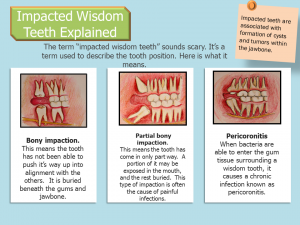
Impacted and erupted wisdom teeth
During the month of March, we are scheduling patients for wisdom teeth extraction with convenient flexibility. Our office location in North Dallas makes it easy to get to us. Most primary and secondary schools have Spring Break scheduled the week of March 10-14 this year and appointments are filling fast. If your dentist or orthodontist has recommended that your wisdom teeth be removed, give us a call today and reserve your appointment now.
Tips For Wisdom Teeth Removal
- Schedule a consultation appointment prior to surgery in order to meet with your oral surgeon, discuss your individual needs regarding wisdom teeth removal and plan for any assistance available through dental insurance. Then plan your surgery when it’s convenient for you.
- Impacted wisdom teeth might sound scary, but the truth is, most people’s wisdom teeth are impacted to some degree. It just means that the teeth are trapped beneath bone or gum tissue. Removing impacted teeth is not necessarily more uncomfortable afterwards than removing teeth which have erupted into the mouth. Plan on recovering at home the day of surgery, and for up to three days after surgery, although it is not always necessary to stay at home in bed during recovery. Most people are up and about, resuming normal activity within a day or two after surgery.
- If you play a horn, plan to take a break for a week or so. It is recommended that musicians avoid windwood instruments for up to a week following wisdom teeth removal. This is because sensitivity, mild swelling and healing surgical sites need a little time to heal. The same goes for aerobic exercise and weight lifting.
- Make a list of the questions you have about the need for wisdom teeth removal, the surgery, anesthesia and recovery. This way, you won’t forget anything important to you when you see your surgeon.
- If you grind or clench your teeth, make sure to tell your surgeon prior to surgery so he can help prevent muscle fatigue and facial muscles from becoming stiff and sore following surgery. In some cases, a special medication may be prescribed in order to help relax your facial muscles to prevent grinding and clenching during recovery from surgery.
- Follow the pre-operative and post-operative instructions provided to you in order to have a smooth and uneventful recovery from wisdom tooth removal. Keeping your mouth clean and maintaining a healthy diet are among the things that can help make your recovery painless
- Contact your surgeon if you have any questions, concerns or if you find that your discomfort level is increasing rather than decreasing. Increasing discomfort, especially after the third day post op can be a sign of a dry socket. A dry socket is a delay in the healing process in which the protective blood clot that forms in the surgical site is dissolved, leaving the tooth socket exposed and uncomfortable. Only about 15-20% of patients who have lower wisdom teeth removed experience a dry socket. The good news s, that at the first sign of one, a medicated dressing can be applied in order to keep you comfortable during healing. An office visit would be required in order to treat a dry socket, but it is well worth it. Prevention of dry socket depends mostly on avoiding smoking and keeping the surgical site clean, however, some patients are simply predisposed to this condition.
- RELAX! The best way to have a smooth experience with wisdom teeth extraction is to do your best to relax and avoid stressing out if you can. IV general anesthesia allows patients to sleep through the procedure peacefully, and wake up without pain once the surgery is over. Discomfort following surgery is usually easily manageable with an over the counter medication such as Advil or Aleve, or with a stronger prescription pain medication.
If it is time to have your wisdom teeth evaluated and removed, schedule a consultation appointment today and take advantage of our special offers available to new patients. Your consultation and panoramic x-ray is FREE, and most dental insurance plans cover the surgical procedure. Patients without insurance can take advantage of our cash payment pricing with an all-inclusive fee of $1185 for surgical removal of four wisdom teeth with IV general anesthesia.
November 15, 2013
Easy Scheduling For Wisdom Teeth During School Breaks
 Thanksgiving is upon us, and the holiday season is drawing near! We hope you have a joyful holiday season enjoying the company of family and friends, along with all the good food!
Thanksgiving is upon us, and the holiday season is drawing near! We hope you have a joyful holiday season enjoying the company of family and friends, along with all the good food!
At Texas Wisdom Teeth and Dental Implants, one thing we see happen every year around this time is an increased demand for appointments. The number of teenagers who need their wisdom teeth removed seems to increase. Over the years, we have realized that wisdom teeth become popular around the holidays because that is when the kids are off from school. No school means the timing is perfect for a short recovery from wisdom tooth removal.
Another reason we see an increase in wisdom teeth patients is due to the fact that annual insurance benefits for 2013 expire at the end of the year. If your dentist has recommended removal of those pesky third molars, you might want to get the treatment done between now and the New Year in order to utilize the dental insurance coverage which expires as soon as the ball drops in Time Square. Unused HSA and Medical Flex accounts also expire on December 31.
We Offer Easy Appointments For Wisdom Teeth Removal
If oral surgery is on your “to-do” list, we have made it easy to make an appointment to see Dr. Weinstein. We are open Monday through Friday this month, with the exception of Thanksgiving Day. Our friendly and knowledgeable team can help you get the treatment you need while maximizing your insurance coverage for wisdom teeth extraction.
Take Advantage of Special Savings on Wisdom Teeth Surgery
If you do not have dental insurance coverage for your wisdom teeth removal surgery, we know how daunting it can seem to afford the cost of oral surgery. For this reason, we are offering a very special all-inclusive surgical fee of $1185 for all wisdom teeth removal surgeries through the end of 2013. This very special wisdom tooth removal package includes consultation and x-rays in addition to the surgical removal of up to four wisdom teeth with IV general anesthesia. You get to sleep comfortably right through the surgery and wake up pain-free from the local anesthesia injections.
Compassionate Patient Care
While convenience and cost are important factors when planning removal of wisdom teeth, it is equally, if not more important to consider patient service when choosing an oral surgeon. Dr. Robert A. Weinstein has over 30 years experience as an oral and maxillofacial surgeon. His genuine concern and compassion for every patient helps take the stress out of visiting an oral surgeon. Dr. Weinstein insists on seeing every patient for a pre-surgical consultation in order to make sure that his patients are comfortable with the planned procedure prior to treatment.
Schedule Wisdom Teeth Removal Surgery
To schedule a consultation for wisdom teeth removal surgery before the end of the year, contact us today. Our friendly team will help you set an appointment that works with your busy schedule.
June 23, 2013
How To Save Money On Wisdom Teeth Extraction in Texas
Your dentist has recommended that you have your wisdom teeth removed, and you are likely nervous about having oral surgery. You are not alone! Most people have some very valid concerns about having wisdom teeth surgery, and at the top of the list is often the cost of oral surgery.
Don’t Panic About Oral Surgery
 The cost of any surgery is a reason for concern. The first thing to do when planning your procedure is a little research. Online research is probably what has led you to this article, so good for you! Information on surgery prices can be a little hard to find online. At the Dallas oral surgery offices of Texas Wisdom Teeth and Dental Implants, we post the fees for some of our most popular procedures right on our website in order to make it easy for you to plan for the cost of surgery. To compare prices on wisdom teeth extraction in Texas, you can conduct a search using this tool:
The cost of any surgery is a reason for concern. The first thing to do when planning your procedure is a little research. Online research is probably what has led you to this article, so good for you! Information on surgery prices can be a little hard to find online. At the Dallas oral surgery offices of Texas Wisdom Teeth and Dental Implants, we post the fees for some of our most popular procedures right on our website in order to make it easy for you to plan for the cost of surgery. To compare prices on wisdom teeth extraction in Texas, you can conduct a search using this tool:
Cost estimates vary widely, but the average cost Nationwide is about $1650-$2300. At Texas Wisdom Teeth and Dental Implants, patients can receive a package fee of $1185, which includes exam, xrays, surgical removal of up to 4 wisdom teeth and IV General Anesthesia. This special price is available all summer long and is available to patients who are not utilizing insurance benefits.
Maximize Your Dental Coverage To Save On Oral Surgery
If you have dental coverage, make sure you understand your plan and utilize the benefits to maximize your coverage. Use an “In-Network” provider to receive special discounts on fees. Make sure you have not depleted your annual benefit before having surgery. Most dental plans will cap the amount they will pay on your behalf in a calendar year. If you are not sure about how your plan works, talk to your HR representative before moving forward with surgery. To learn more about how to maximize dental insurance for wisdom teeth removal, read this special report.
Consider Your Financing Options For Wisdom Teeth Surgery
Many dental offices and oral surgeons offer special financing options for patients in order to help spread the cost of oral surgery out over time. Many financing plans offer low or no-interest plans. At Texas Wisdom Teeth and Dental Implants, we offer no interest payment plans for 6 months on wisdom teeth removal. For more information on payment plans for oral surgery, click here.
Consider Traveling To A Lower Cost Area To Save On Wisdom Teeth Removal
Fees for services such as wisdom teeth extraction vary depending on geographical areas. If you live in an area where healthcare costs are high, consider traveling to a surgeon in a lower cost area. Patients across Texas travel to Dallas to save money on wisdom teeth removal. We see patients from Waco, Sherman, Midland and even as far away as Austin. You might find that the cost of driving to Dallas and spending a night in a hotel is worthwhile if your savings is several hundred dollars or more. If you are traveling to Dallas for wisdom teeth removal, our helpful team can assist you in finding accommodations near our office. As an added bonus, patients who have their oral surgery at Texas Wisdom Teeth and Dental Implants can claim a voucher for FREE Companion Airfare anywhere in the contiguous United States while our supplies last! Talk about savings! Not only can you save on the cost of surgery, but you can save on a future vacation as well.
With a little research and planning, you can save money on the cost of wisdom teeth extraction. The team at Texas Wisdom Teeth Associates in Dallas can help. Give us a call today to schedule your consultation appointment.
BONUS:
Free consultation and panoramic x-ray coupon
June 10, 2013
Why Did My Orthodontist Recommend Wisdom Tooth Extraction This Summer?
Your teen has been in braces for three years, and it has truly been a labor of love to make sure they got to all their appointments on schedule. Your bank account likely reflects that the cost of raising a child is estimated at over $200,000 over a lifetime. Kids are expensive, and so is orthodontic treatment. Now, your child’s orthodontist has recommended that his wisdom teeth be removed this summer. Your teen’s wisdom teeth are not hurting him, so why the big rush to do surgery? This article is not meant to scare you or sensationalize the risks of avoiding wisdom teeth extraction.
Should some wisdom teeth be left alone? Absolutely! Should you ignore a recommendation for wisdom teeth surgery? Absolutely not! Here is why you should definitely have a consultation with an oral surgeon if your child’s orthodontist has recommended wisdom teeth removal.
Your Orthodontist Is Not Crazy, He’s Protecting Your Investment
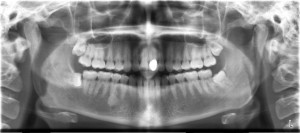
Impacted wisdom teeth
I know, that title sounds like a pitch, but the fact is, there are numerous reasons that wisdom teeth might be recommended for extraction, even when there are no painful symptoms associated with them. Let’s take a minute to discuss some of the proactive indications for removal of wisdom teeth.
- Your orthodontist has a greater chance of success and ease of treatment moving the molar teeth when the wisdom teeth are not obstructing the path. When the wisdom teeth are impacted or partially erupted, they are often positioned right behind or under the second molars. These second molars cannot be moved easily or effectively with the wisdom teeth causing an obstruction.
- Once the braces are removed, the teeth are free to shift back into malposition. Removing the wisdom teeth helps prevent orthodontic relapse and dental crowding once the braces are removed. Incidentally, diligent use of the retainer all the way past age 25 is recommended for prevention of orthodontic relapse.
- Malpositioned wisdom teeth can cause damage to the adjacent teeth. Some of the damage that can be caused by malpositioned wisdom teeth includes tooth decay, gum disease and loss of bone around the second molars.
- Wisdom teeth can develop destructive pathology. Cysts, tumors and other pathology sometimes forms around an impacted wisdom tooth. Pathology such as this may be completely asymptomatic for a very long time. Once symptoms, pain, swelling develop, a cyst or tumor has usually already done damage to the jaw bone and/or teeth.
- Even erupted wisdom teeth are very hard to keep clean. Inadequate dental hygiene due to difficulty of access to the wisdom teeth can cause tooth decay and gum disease, putting other teeth at risk for damage and tooth loss.
What Happens If I Just Wait Until The Wisdom Teeth Cause Pain?
Your orthodontist is trained to identify the potential for future problems with the teeth as well as
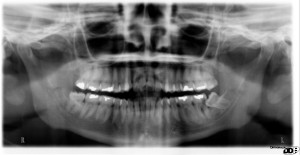
Impacted tooth on lower has caused decay in adjacent tooth
diagnose and treat current problems. When your orthodontist recommends wisdom tooth extraction, it is typically for one of the reasons listed above. The only thing in it for the orthodontist is the satisfaction of a job well, done. He doesn’t earn any compensation for sending your child off to have their wisdom teeth removed, he honestly just wants to give you the best advice possible, and protect your investment of money, time and energy, which are all spent in straightening a teenager’s teeth. If you received a recommendation for wisdom teeth extraction, and decide to wait until symptoms develop, here are the risks you are taking:
- Wisdom teeth pain can be very uncomfortable. Your teen will probably develop the most severe symptoms in the middle of the night on a Saturday, if we buy into the whole “Murphy’s Law” philosophy. If this happens, you will either find yourself in the ER or frantically trying to get a last minute appointment first thing Monday morning.
- Dental crowding cannot be reversed by removing the wisdom teeth. If you wait for dental crowding or orthodontic relapse to occur, plan on starting the whole orthodontic treatment all over again- the teeth won’t shift back into position without braces.
- Tooth decay does not usually cause pain until the decay reaches the pulp of the tooth. Once this happens, repair of the tooth is usually extensive and costly, assuming the decay can be repaired in the first place. Second molars are important teeth- you definitely want your teen to keep them for a lifetime!
- Chronic infection is annoying, painful and can actually progress into a serious health concern. The same bacteria which cause gum disease cause chronic infection of the wisdom teeth. Some of these bacteria have been identified as a possible catalyst to systemic health conditions such as heart problems. At the least, chronic infection damages the gum tissue and results in loss of bone (which, by the way, holds the teeth in the jaw). In rare cases, chronic infection can settle in the bone itself, a condition called osteomyelitis, which can be very serious and require hospitalization.
- Cysts and tumors destroy precious jaw bone structure. If left untreated, benign cysts and tumors associated with impacted wisdom teeth will continue to grow and destroy any bone in its path. When there is extensive damage to the jaw bone, the jaw is at increased risk for pathological fracture. Teeth are often damaged and lost when a cyst or tumor is left untreated. Sometimes, pathology such as this becomes infected, further complicating the treatment required to resolve it.
This summer, if you received a referral from the orthodontist to have your teenager’s wisdom teeth extracted, don’t procrastinate. Find out how urgent the issue really is before you make a decision. Sometimes waiting is just fine- sometimes it is not. Go for a consultation with an oral surgeon, get facts and answers. Educate yourself on the pros and cons of wisdom teeth extraction, and make your decision based on what you learn. If this information is helpful to you, share it with a friend!
April 29, 2013
Impacted Wisdom Teeth- A Visual Guide
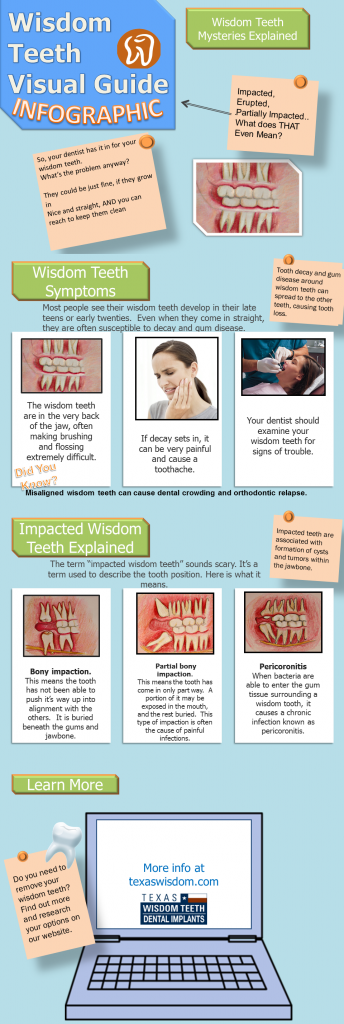
A Visual Guide To Impacted Wisdom Teeth
Impacted, Erupted, Partially Impacted- What does all that even mean? Your dentist has it in for your wisdom teeth, but at the moment they are not hurting you. Before you decide to wait to act upon your dentist’s advice to remove your wisdom teeth, make sure you know all the facts about impacted third molars.
Why Remove Wisdom Teeth?
When it comes to dental surgery, most people are of the attitude “If it ain’t broke, don’t fix it”. This is a really great rule of thumb as long as you recognize that pain is not the only indicator of wisdom teeth problems. In fact, there are many instances in which the third molars can be seriously dysfunctional and even destructive without experiencing pain. Like most dental conditions, such as tooth decay and gum disease, pain does not usually enter the picture until the disease or condition has become quite advanced. Your wisdom teeth are no different. It’s a good idea to have your dentist examine your third molars for signs of pathology, disease, decay or other problems. If he makes a recommendation to have the wisdom teeth removed, ask for an explanation about “why”, so you can understand if there are underlying problems that exist, but perhaps are not painful at the moment.
Impacted Wisdom Teeth
An impacted tooth is one which has not ‘erupted’ into the dental arch, in alignment with the other teeth. It is positioned within the jaw bone, covered completely or partially with bone and gum tissue. Just because a tooth is impacted does not mean it must be removed. Some wisdom teeth are positioned in such a way that removal can cause more risk for complications than leaving the tooth alone. Only an oral surgeon is best qualified to assess impacted wisdom teeth and make this determination.
Some signs of trouble with impacted teeth include:
- Malpositioned tooth which has the potential to cause harm to the adjacent teeth
- Improper tooth positioning which causes misalignment and crowding of the other teeth, especially after previous orthodontic therapy.
- A wisdom tooth which has erupted only partially creates a prime environment for bacteria, resulting in chronic infection, gum disease, decay and pain.
- Formation of destructive cysts around the wisdom tooth which can destroy jaw bone and cause loss of the adjacent teeth, infection or even pathologic jaw fracture
While the problems outlined in this graphic are not the only problems we see associated with impacted wisdom teeth, they are the most common. Some of these problems do not cause physical pain until they have become advanced. As with all dental problems, it’s usually less expensive, less traumatic and easier on you to take care of problems while they are still in their early stages. Ask your dentist about the health of your wisdom teeth, or visit our Dallas oral surgery practice to find out whether your wisdom teeth are healthy enough to keep.
Impacted Wisdom Teeth- A Visual Guide – An infographic by the team at Impacted Wisdom Teeth- A Visual Guide


